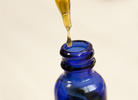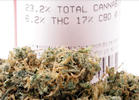
If you thought the federal government was going to jump on the CBD bandwagon, you thought wrong.
The Food and Drug Administration (FDA) issued a report on CBD on November 25 and it wasn't good news.
"There are many unanswered questions about the science, safety and quality of products containing CBD." the report ominously begins.
"The FDA is concerned that people may mistakenly believe that trying CBD 'can’t hurt.' The agency wants to be clear that we have seen only limited data about CBD’s safety and these data point to real risks that need to be considered. As part of the drug review and approval process for the prescription drug containing CBD (Epidiolex), it was determined that the risks are outweighed by the benefits of the approved drug for the particular population for which it was intended."
The FDA outlines three major concern:
1. Liver injury: "Although this risk was increased when taken with other drugs that impact the liver, signs of liver injury were seen also in patients not on those drugs. The occurrence of this liver injury was identified through blood tests, as is often the case with early problems with the liver. Liver injury was also seen in other studies of CBD in published literature. We are concerned about potential liver injury associated with CBD use that could go undetected if not monitored by a healthcare provider."
2. Drug interactions: "There is a risk of CBD impacting other medicines you take – or that other medicines you take could impact the dose of CBD that can safely be used. Taking CBD with other medications may increase or decrease the effects of the other medications. This may lead to an increased chance of adverse effects from, or decreased effectiveness of, the other medications. Drug interactions were also seen in other studies of CBD in published literature. We are concerned about the potential safety of taking other medicines with CBD when not being monitored by a healthcare provider. In addition, there is limited research on the interactions between CBD products and herbs or botanicals in dietary supplements. Consumers should use caution when combining CBD products with herbs or dietary supplements."
3. Male reproductive toxicity: "Studies in laboratory animals showed male reproductive toxicity, including in the male offspring of CBD-treated pregnant females. The changes seen include decrease in testicular size, inhibition of sperm growth and development, and decreased circulating testosterone, among others. Because these findings were only seen in animals, it is not yet clear what these findings mean for human patients and the impact it could have on men (or the male children of pregnant women) who take CBD. For instance, these findings raise the concern that CBD could negatively affect a man’s fertility."
"The agency wants to be clear that we have seen only limited data about CBD’s safety and these data point to real risks that need to be considered."
It's been posited for years that marijuana reduces sperm count in men and has a "significant negative effect on male reproductive health," so their third concern is nothing new.
Regarding liver injury, researchers at the University of Arkansas for Medical Sciences recently determined, based on a mouse study, “people that use CBD are at an elevated risk of liver toxicity.”
That study has been debunked by Project CBD, caling it "a Pandora’s box of strange statements, problematic publishing and unreasonable experimental design," adding: "The study is a hit piece against CBD, not legitimate scientific work."
The FDA also noted it's continuing to look into "cumulative exposure" (using different CBD products in the same day), "special populations" (the elderly, children, pregnant women) and "CBD and animals" (saftey of use by pets).
The report stresses that it's "currently illegal to market CBD by adding it to a food or labeling it as a dietary supplement" and "some CBD products are being marketed with unproven medical claims and are of unknown quality."
More negative effects of CBD, according to the agency, include drowsiness or sleepiness, gastrointestinal distress (i.e. diarrhea) and changes in mood (irritability, agitation).
This is contrary to most peoples' experience with CBD, which is generally used to combat anxiety, pain and inflammation.
The FDA has previousaly sent warnings to companies like Curaleaf for making health claims aboiut CBD.
The $1 billion U.S. CBD industry, which is projected to balloon to $16 billion in 2025, can't be happy with this report, which was predictable with the Republican control of the White House and the Senate.
Read the full FDA report on CBD here.






